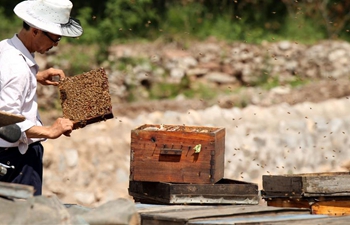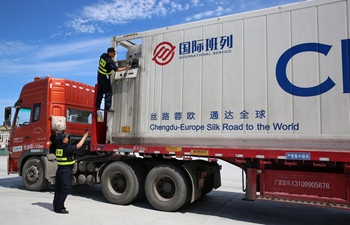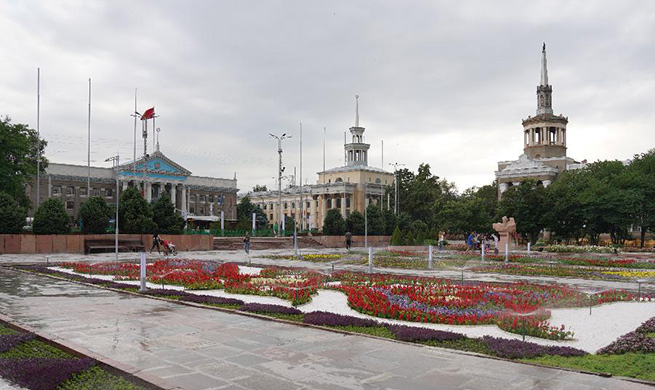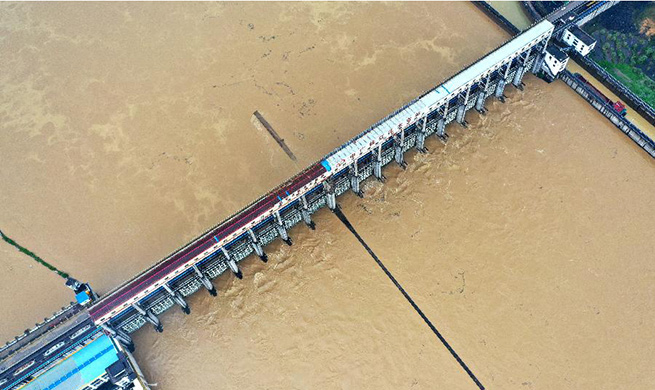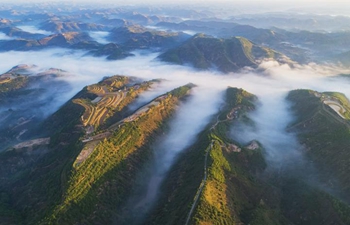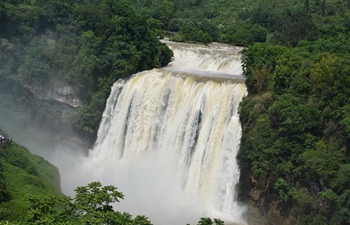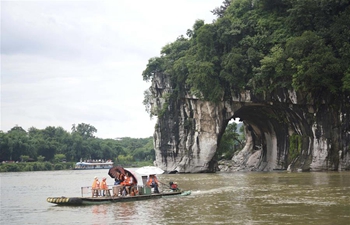URUMQI, June 11 (Xinhua) -- After filling the holes drilled into the rock with sausage-like packaged explosive and bunching the detonators with fuses, a blaster retreated from the rock letting the detonation wire drag out in his wake.
He set the initiator ready and looked to Luo Zhaobing for his cue. Luo, 47, confirmed that there was no one in the 300-meter danger zone and gave the word.
"Ready!"
"3, 2, 1, fire!"
A total of 200 kilograms of explosives crushed a four-meter-thick rock formation in three seconds, throwing up billows of dust and deep rumbles through the tunnel where Luo and his colleague were standing.
The 13-km-long tunnel in the Altun Mountains, northwest China's Xinjiang Uygur Autonomous Region, is the longest tunnel in the region's section of the Golmud-Korla railway. Over 3,700 blasts are needed to carve away this much rock.
Thanks to the professionalism and caution of experienced blasting workers like Luo, construction of the railway could now march on into China's deep west.
Once opened, the route linking the city of Golmud in northwest China's Qinghai Province to Korla in Xinjiang will boost development near the border, in turn benefiting countries along the Belt and Road.
"Estimation accurate. No need for a second blast," Luo said calmly as he inspected the site post-explosion.
Although Luo had worked on 13 construction projects across the country since 1989, this was his first time working in "no man's land," more than 3,000 meters above sea level.
The remoteness meant that water had to be carried 100 kilometers away, and without a pressure cooker, the workers could not even make noodles. Their only companions were the wolves that showed up frequently around the construction site.
But this was nothing compared to the difficulties Luo and his colleagues faced in their blasting work.
There are 11 fault zones hidden in the mountains that disperse the power of the explosives, and water that has collected there will gush out from them, sometimes unexpectedly, Luo explained. If the volume of water is big enough, it has the force to knock a worker from the scaffolding.
"You can never be too careful dealing with explosives in the mountains," Luo said.
As a child, Luo listened to his railway worker father talk about tunnel drilling. His family could not afford school for all three of their children, so Luo and his sister dropped out so that their little brother could finish school.
As a result, Luo became a blasting worker and learned about rock stratum, explosive charges and blasting control.
It was even more dangerous work back then. Workers would use open flames to ignite paper detonators.
Although the electric detonators used now are much safer, crushed rocks from the blast can still hurt people and tunnels could collapse before they can be reinforced with cement.
"People who don't know about blasting might be frightened, but experienced blasters have a calmness that comes from their proficiency and deep understanding of the dangers," Luo said.
Luo has now become someone that young blasters turn to for guidance. Dong Chaoyang, a 26-year-old worker, has been learning from Luo for a while. He hoped that he could acquire Luo's calmness as he worked on more blast projects.
Just as young workers learn when they blast through the rocks, young railways found their way through the newly-blasted tunnels.
"Wherever a tunnel is blasted and built, there will soon be a new railway running through it," said Luo.
Luo has yet to take one of the trains through the tunnels that he helped construct, but he knows he will one day.





